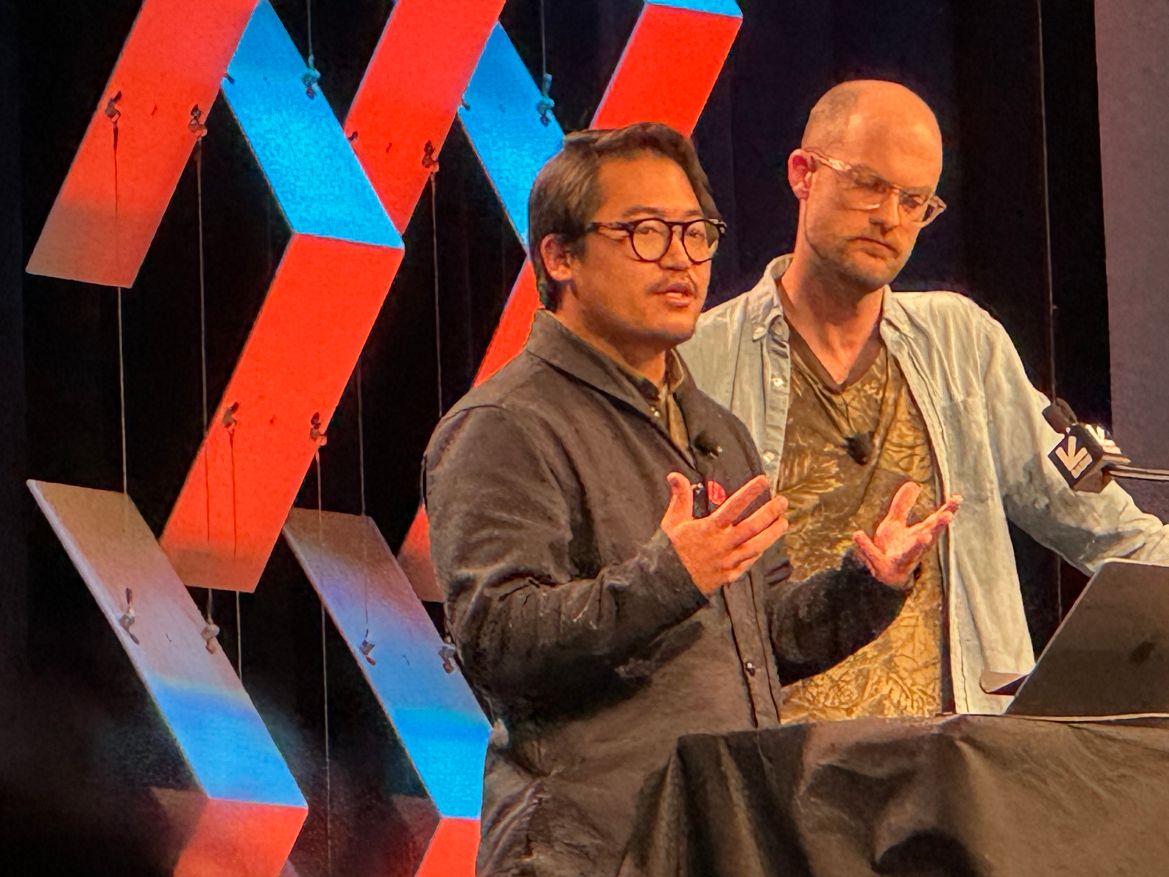A theme I discerned at several SXSW sessions this year was storytelling. The best of the lot was appreciated by a very large audience with a standing ovation. It was the only one I experienced at SXSW in Austin this year, so I particularly wanted to share it with my readers.
This comes from a dual presentation by the filmmakers whose most famous collaboration was the amazing film Everything Everywhere All At Once, which won the Oscar for Best Picture in 2022.
Daniel Kwan began his philosophical look at what technology is doing to us by alluding to the Luddites, a group of textile workers in England just over 200 years ago who opposed the use of cost-saving machinery.
“Generally our relationship with innovation is that it’s all pretty great and that anyone who stands in the way of it was kind of a dumb Luddite who didn’t understand what they were doing. We want to provide a counter-narrative to show something that is deeply important is being sacrificed everytime our story changes, everytime we move ahead in society. And it’s often most evident in the stories we tell ourselves.
“The thing about innovation is it gives us things more efficiently, and that opens up society to do more things, to have more things. But oftentimes the process tips over and we become too good at it. With too much convenience comes disposability.”
Daniel Scheinert interjected. “Every convenience creates its disposability: you’re going to take whatever that thing is that you made shorter, faster, and you’re making it less valuable. You’re making it something ‘to get through.’”
“In order to make something more disposable, “Kwan continued, “we actually have to change the relationship with the world around us and change the stories we tell. A lot of the earliest cultures believed in animism – that every rock and tree had a soul. A lot of modern people laugh at that, but regardless of what you believe, that story is actually beautiful because it kept things in balance. We have slowly created an entire world where everything is disposable. We are all culpable, but the worst part is we’ve even done it to the people. These devaluing stories become normalized, compounded through generational amnesia.
“For example, capitalism only works if we compel people to work, because we can’t force them to work. As so we had to change the story we told ourselves, to say that your value is your job: you are only worth what you can do. We are no longer beings with an inherent worth. This is why it’s so hard to find fulfilment in this current system: the system works best when you’re not fulfilled. Which brings me back to AI.
“AI is probably going to solve cancers and give us a lot of climate solutions. This is a powerful thing but I’m really terrified of what this new story we’re going to have to tell ourselves in order to accept this new progress. Imagine what this technology will do in this current system and incentive structure. This is the same system that brought us climate change, income inequality and general lack of gratitude and understanding of the worth of those around us. Everyone is saying ‘Chase it! Get ahead of it!’ If you’re anxious about AI, it’s because you know, deep down, we’re next. Even if the jobs aren’t going to be lost, the value of the job will go down. It will slowly be normalized until you don’t even realise it and we’re now in a place where everyone is disposable. There is no longer any longevtity between employees and employers, or even friendship. We are now in a place where we are more lonely than we’ve ever been, and we all understand it’s because of this technology, this social media, rewriting our story.”
If you feel overwhelmed by the rush of technology that was such a major topic at SXSW this year, consider living in the film Everything Everywhere All At Once. IT might be a somewhat experience (that was a tech pun). I can’t say for sure, but I believe it was this passage in particular that so resonated with the audience that they jumped to their feet at the conclusion. Kwan next related all this to their role as storytellers (ie filmmakers):
“One of the things I am realizing,” Kwan admitted, “we all have to be doing as storytellers is we really have to rewrite the system story. And centre what is truly valuable. For me, it means our humanity and the connexion we have to our communities and environment. It might seem crazy that our short films or poems might actually make a dent in the system. Sometimes it feels like throwing little rocks at this giant brick wall. But we have to remember the systems we have now re just fossilized stories of the past, and this current fossil is crumbling, we actually have an opportunity to rewrite the stories for tomorrow. We have to undo what the stories have done to us, to our value and the value of everything around us.
Scheinert joked that “Kwan uses it all the time and is going home to apologise to Chat GPT!” On a serious note, he cautioned people to “think about why you are using AI: are you using it to create the world you want to live in, to increase value in your life and focus on the things you really care about? Or are you just trying to make some money for the billionaires? If someone tells you there’s no side effect, get on board, I just want to go on the record as saying that’s terrifying bullshit. We should be talking really deeply about to carefully deploy this stuff.”
photo by C Cunningham: Kwan (l) and Scheinert
